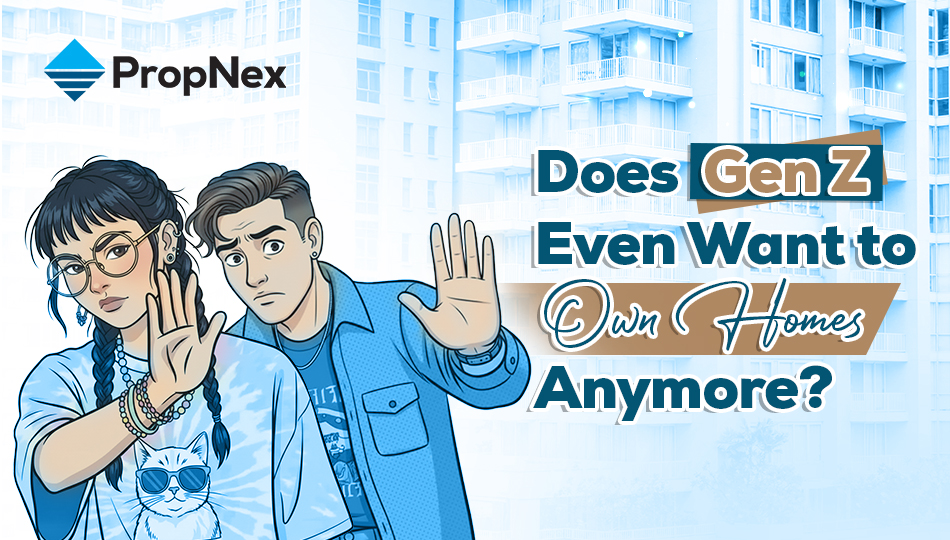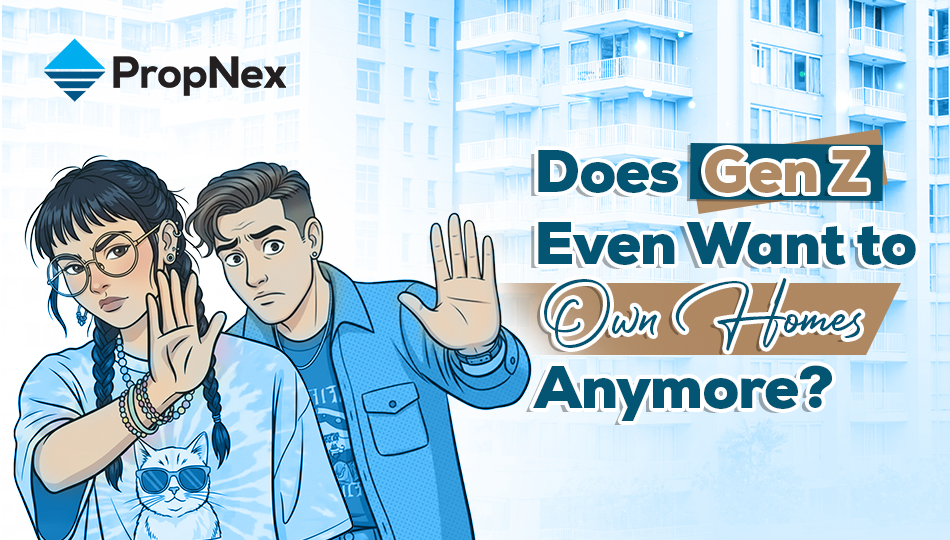PropNex Picks
|November 27,2025Does Gen Z Even Want to Own Homes Anymore?
Share this article:

If you think millennials had it rough, you should see how Gen Z is coping. Just ask any twenty-something-year-old about buying a home and you'll probably get a half-laugh, half-sigh.

Between the never-ending BTO wait, soaring resale and new launch prices, and the daunting idea of committing to a 30-year mortgage, owning property just doesn't feel as attainable as it did for the older generations. So does that mean Gen Z is, as they would say, cooked? Should we just give up the dream of homeownership?

Surprisingly, most Gen Zs still see real estate as a reliable way to build wealth, at least according to a recent survey. But at the same time, many feel it's getting harder to break into the market, with affordability ranking among the biggest concerns.
Considering that many are still in school or just starting out in their careers, it's no surprise that buying a home isn't their priority right now. Property ownership feels more like a "later" goal.
Still, the desire to own hasn't disappeared. While they may not view property as a status symbol the way older generations did, many still prefer owning over renting. So it's not that Gen Z doesn't want to own homes, it's just that times have changed. With so much more to consider and other priorities to juggle, buying a home simply isn't at the top of the list right now.
Let's be real, buying a home in this day and age is no small feat. And it's not hard to see why many Gen Zs are taking a step back.
While household incomes have grown over the years, property prices have risen faster. In 2019, the median income per household member was about $2,925 per month. By 2024, it had grown to $3,615. An increase of roughly 23.6%, not accounting for inflation!
But over that same period, the average HDB resale price jumped from $432,138 to $612,597. That's a 41.8% increase, nearly double the pace of income growth. To put that into perspective, if the average person earns about $3,615 a month (or roughly $43,380 a year), the price gap of $180,000 between 2019 and 2024 is more than four times their annual income. And we're still talking about HDB here. With private properties, the gap can be even steeper!
- Economic uncertainty
Beyond affordability, Gen Z faces other pressures too, from rising interest rates, inflation, to job insecurity. It's not that they're uninterested in property, they just have to be extra cautious in today's climate.
- Delayed milestones
More young Singaporeans today are choosing to focus on their education, career, or travel before settling down. And that has a real impact on when they can buy a home. If you're single, you can't apply for a BTO until you're 35 years old. Private properties might feel even more out of reach since there are no subsidies.
For married couples, the minimum age requirement is lower at 21 years old. But if you haven't found the one yet, or you plan to marry later, then homeownership naturally gets pushed back too.

- Lifestyle choices
Gen Zs typically value flexibility, experience, and self-expression, which are things that don't always align with being tied down by a long-term mortgage. Many want the freedom to work or live abroad, take career breaks, or switch jobs frequently to explore new opportunities. With that mindset, renting or co-living can feel more practical than owning (at least for now).
Even with all that said, Gen Zs in Singapore are in a far better position than their peers in other countries. Here's why homeownership remains firmly within reach here, and why our Gen Zs will eventually enter the property market.
- Affordable public housing
Compared to private property or overseas markets, HDB flats remain an attainable entry point. The government does a lot to ensure that BTO flats are priced fairly, and first-timers get priority allocation. That makes owning a home much more feasible.
- Housing grants
On top of that, the government offers several housing grants for those who qualify. First-timers can even unlock up to $230,000! Surely, these subsidies can help Gen Zs afford their first home.
- Central Provident Fund (CPF)
As an employee in Singapore, your employer automatically contributes to your CPF every month. These contributions help you save for retirement, housing, and healthcare. Essentially, it builds a financial safety net over time.
The CPF contribution rate depends on a few factors: whether you're a Singapore Citizen or Permanent Resident, your age group, and your total wages, which you can check here. Together, your own and your employer's contributions form a steady pool of savings that many eventually use to buy their first home.
However, do note that when you sell your flat, you need to return the grant PLUS CPF interest back to your CPF account. Here's a short clip to help you understand it better.
4. Deep-rooted homeownership culture
In Singapore, homeownership isn't just an aspiration, it's part of our cultural DNA. Around 90% of Singaporeans own their homes, a figure that speaks volumes about how deeply it's tied to our sense of stability, identity, and belonging.
Even the younger generation still shares the same sentiment. Surveys show that 70% of young Singaporeans prefer owning over renting. And, 86% of Gen Z view their home as a reflection of their independence and personality.
To my fellow Gen Z, buying your first home might feel intimidating, but it doesn't have to be. Here's a quick checklist to help you get started.
- Start planning now
Even if you're not buying yet, understand how your CPF contributions grow, what grants you qualify for, and how loan limits affect your affordability. The earlier you map this out, the easier it'll be to make smart moves later.
- Build the right mindset
Your first home doesn't have to be your forever home. See it as a stepping stone. A base that can grow your equity and open doors for future upgrades. Starting small can make all the difference. This is what Property Wealth System (PWS) is all about: learning how to sequence your property moves strategically. So every decision builds towards financial freedom, not just ownership.
- Run the full numbers.
Don't just look at the selling price. Add up everything from your monthly loan repayments and CPF usage to stamp duties, legal fees, and renovation costs. These can easily add tens of thousands to your total bill. Use our calculators to see how much you can comfortably afford without stretching your budget.
A BTO flat usually takes 4-5 years to complete, plus 5-10 years Minimum Occupation Period (MOP) depending on the type of flat you're getting. So in total, you'd be locked in for 9-15 years. However, it also comes with stronger subsidies and lower prices. Resale flats and ECs, on the other hand, offer immediate occupancy but fewer subsidies.
- Think long-term
Where you live can shape your day-to-day life. Consider career plans, proximity to families, and potential future family needs. Living closer to your parents, for instance, could make childcare support easier down the road, or on the contrary, let you care for them as they age.
- Get mortgage pre-approval early.
Don't wait until you've found your dream home to check your loan eligibility. A bank or HDB loan pre-approval gives you a clear sense of your borrowing limit, interest rates, and repayment period. So save yourself some time and get that pre-approval!
- Seek guidance, not just listings.
Get professional help. Someone who understands first-time buyers and youth-focused finance options. The right agent can help you navigate grants, CPF usage rules, and negotiation strategies that maximise your budget.

Gen Zs still want to own homes. They're simply pacing themselves differently, given how shaky the economy feels right now. But don't be discouraged, because here in Singapore, we have some advantages. From affordable public housing, schemes and grants, and CPF savings to the "must-own-home" culture.
Even if you're not ready to make a purchase, what you can do is start planning from now on. You can also join us at the upcoming Property Wealth System (PWS) Masterclass to learn more about how you can use property as a tool to build the life you want.
Views expressed in this article belong to the writer(s) and do not reflect PropNex's position. No part of this content may be reproduced, distributed, transmitted, displayed, published, or broadcast in any form or by any means without the prior written consent of PropNex.
For permission to use, reproduce, or distribute any content, please contact the Corporate Communications department. PropNex reserves the right to modify or update this disclaimer at any time without prior notice.



